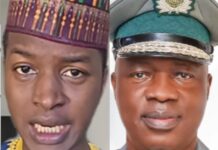By Johnson Eyiangho
#TrackNigeria: The Chief of Army Staff, Lt.-Gen. Tukur Buratai on Thursday acknowledged the power of the media, saying they had the ability to stabilise or distabilise situation in any given security environment.
Buratai noted that the role of the media in the fight against insecurity in the country was key in shaping public opinion.
He made the remark at a two-day Media Conference organised by Nigerian Army in partnership with the Nigerian Guild of Editors, Nigeria Institute of Public Relations, Guild of Corporate Online Publishers and Guild of Professional Bloggers of Nigeria.
The theme of the conference is “Enhancing Military Media Relationship for Effective Fight against Terrorism and Insurgency in Nigeria.’’
The army chief, therefore, appealed to journalists to report “what is right as at when due to avoid putting the lives of security agents in danger.’’
He said: “In your capacity as editors, you have the responsibility of finding details of events, possibly by getting in touch with military command before going to press.
“When this is observed it will go a long way in addressing some of the challenges faced in reporting issues affecting national security.
“It is important to note that the leakage of vital information on military operation like the ongoing fight against Boko Haram terrorists is inimical to national security as this will give our position to the terrorists and give them upper hand in their psychological war against the troops.’’
Buratai said that not all information regarding military operations could be made available to media due to some obvious reasons.
“This is because we are also ‘gatekeepers’ in keeping secret of vital military operations for national security.
“However, when such operations are conducted, relevant details will be made available to the media for public consumption.’’
He called for patience and assured that the military is committed to carrying the media along in the discharge of its duties in line with the dictate of constitution and international best practice.
Buratai said: “The war against terrorism should be a collective responsibility for all, and not just a war between the military and the terrorist groups.
“The war needs to be reported as it is, and therefore, the media needs to enlighten the people to understand the true situation and support the military.
“The impact of the terrorists’ propaganda is one of the major challenges facing the military by discouraging and dampening morale of the troops in the front line.
“Let me use this opportunity to stress that the commitment of the Nigerian Army to maintain cordial and mutual relationship to enable it end terrorism and insurgency and enhance national security is our top most priority.
“Therefore, your effective reportage of the campaign against insurgency, restoration of peace in the Northeast and protection of lives and properties in the country will go a long way to counter the terrorists’ narrative.’’
Earlier in a welcome address, Brig.-Gen. Sani Usman, the Director Army Public Relations, noted that the military and the media were partners in progress as both were working for the common good of the society.
Usman also said that army was deployed in various parts of the country on internal security duties in aid of the civil authority and the fight against terrorism and insurgency to safeguard the nation.
“As expected, these operations have been subject of media coverage and enquiry.
“However, most of the reportage tend to negate the basic principle of giving the military fair hearing and were not reported in the context of national security objectives.
“Thus creating room for mutual suspicion and misunderstanding,’’ the army spokesman said.
He expressed hope that the deliberations at the conference would lead to far reaching decisions that would form the basis for further engagement and understanding dynamics of the army, regarding national security. With reports by (NAN)



